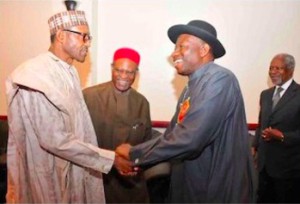. . DEMOCRATIC PARTICIPATION . .
an article by Nigerian Tribune
The Special Adviser to the President on Inter Party Affairs, Senator Ben Obi, has stressed the need for political stakeholders at all levels to buy into the key ingredients of the peace accord, which was recently signed in Abuja, by presidential candidates and chairmen of registered political parties, including President Goodluck Jonathan of the Peoples Democratic Party (PDP) and General Muhammadu Buhari of the All Progressives Congress (APC).
Presidential candidates Muhammadu Buhari (left) and Goodluck Jonathan (right)
Speaking with newsmen in Abuja, Senator Obi whose office and that of National Security Adviser (NSA) created the platform and facilitated the epochal event, stressed that the Abuja ceremony was not meant to be an event in itself but the beginning of a wider nationwide process involving all political stakeholders, security institutions, civil society bodies and youth group across the country.
He stated that in developing the programme of the Peace Accord,they had in mind the implementation of a broad range of strategic objectives that would be co-owned by the major campaign organs of the leading political parties at the national, zonal, state, local government and ward levels.
The presidential adviser reiterated that key components of the peace accord included public sensitisation, youth education, peace building projects and community-wide awareness campaigns involving not just all the tiers of political campaigns but also traditional rulers, community and religious leaders.
He said some of the processes would involve workshops, seminars and town hall meetings on a continuous basis until the culture of peace and non-violent conducts during and after elections were inculcated into the Nigeria people, especially the youth.
He further charged that even though his office and that of the NSA took the lead in facilitating the Peace Accord, the responsibility now lies with the leaders and the people to own the agenda and drive it forward to its logical conclusion.
How should elections be organized in a true democracy?
Latest reader comment:
CPNN receives more and more articles from Africa about initiatives that contest the European model of “winner-takes-all” elections, and demand that elections should only be part of a broader democratic process that seeks consensus and compromise.
This fits with the pre-colonial systems of justice in Africa, when there was no monotheism and no single supreme god, no single supreme law, no single “truth” provided by divine intervention, but rather a compromise among many different “gods,” perspectives and “truths” arrived at through a process of mediation, for example, the “palabra.”
Here are some of the articles:
Ghana Youth Coalition wants politicians to commit to peace in 2012
Women’s World in Nationwide Sensitization [Sierra Leone]
Varsities vouch for peace ahead of general elections (Kenya)
Zimbabwe: Christian denominations launch peace initiative
